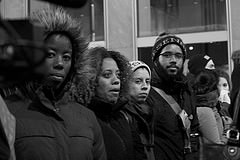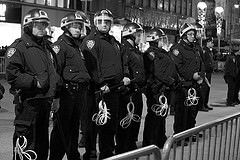“My dear children, I write this to you so that you will not sin. But if anybody does sin, we have an advocate with the Father—Jesus Christ, the Righteous One.” I John 2:1 (NIV)
A couple weeks ago I was preparing a lesson for the adult Sunday-school class I help teach. (Sounds a little old fashioned and quaint, doesn’t it?) The text was the second chapter of John’s first letter.
As I took notes on my computer, I checked the news as it developed through the day—and the developing news that day was the demonstrations following the grand-jury decisions concerning two white police officers, Darren Wilson and Daniel Pantaleo, and the deaths of two black men, Michael Brown and Eric Garner.
I am a white man, in a predominantly white Sunday-school class, in a predominantly white church, in a predominantly white city, in the predominantly white state of Missouri. I probably don’t have to remind you that Ferguson is in our state, too.
My lesson ended up tracing through the themes of I John 2. If we know Jesus, we will obey him. If you hate your brother, you live in darkness. Do not love the world. Beware of antichrists, who deny the Son.
But mixed with the verses on my computer screen were the headlines about the protests, the demonstrations, the riots, and the arrests.
Becoming Advocates
 When I taught the class, after working through the chapter, I returned to the first verse, that verse that touches on the tension between justice and grace. Do not sin, John says, but if you do, Jesus will take your side. Jesus is our advocate before God, the judge. While Satan is the prosecutor, Jesus is the defense attorney.
When I taught the class, after working through the chapter, I returned to the first verse, that verse that touches on the tension between justice and grace. Do not sin, John says, but if you do, Jesus will take your side. Jesus is our advocate before God, the judge. While Satan is the prosecutor, Jesus is the defense attorney.
Maybe it was a stretch, I told my class, but I needed to address what was going on in our country. I needed to talk about it, even if I had to shoehorn it in a little. If we Christians want to “live as Jesus did” (v 6), then we need to make ourselves advocates, too.
It’s an odd thing to think of God pleading our case to God. But the creator has shown us his love, his concern, his grace by mingling with us, talking with us, sharing meals with us. Through Jesus’ life on earth, he has empathy for us (Hebrews 4:15), and he has become our intercessor in heaven (Romans 8:34).
We need to listen to those who have different experiences than ours, to learn their perspective. As a white person, I realize my need to listen to the stories of blacks, to try to see the world through their eyes.
Don’t get me wrong. I’m not saying in this picture that I am Jesus and blacks are the sinners needing my advocacy. Instead, I’m saying that all us Christians—of all races—need to imitate Jesus in breaching the walls that divide us and to plead for each other, before man and before God.
Months ago, well before these two high-profile incidents, many black people were already afraid of police officers. I could argue all I wanted that they shouldn’t be afraid, but my arguments would probably show how out of touch I am. Theirs is a fear that goes well beyond the nervousness I have when a police car pulls up behind me at an intersection.
Why is that? If we hope to understand, we’ll need to do a lot of listening, and not just to those who would reaffirm our comfortable assumptions. We’ll need to read viewpoints of people who’ve lived lives unlike our own. We’ll need to try to see the world through the eyes of people who don’t look like us. That doesn’t mean that we must always agree with what we hear. Often, the loudest, most strident voices are not the most reasonable. But if we want to hear the quieter voices, then we’ll need to listen that much harder. And then we can pass on what we hear, speaking on behalf of our brothers and sisters, to each other and to God.
The Other Side of Fear
 Black civil rights attorney Constance Rice has worked for years building trust between minorities and the police in Los Angeles. While she started out as an adversary to LAPD Chief Charlie Beck, suing the department multiple times, they are now partners in reform.
Black civil rights attorney Constance Rice has worked for years building trust between minorities and the police in Los Angeles. While she started out as an adversary to LAPD Chief Charlie Beck, suing the department multiple times, they are now partners in reform.
During an 19-month period, Rice interviewed over 900 police officers. On NPR’s Morning Edition, she says that their talks became like “therapy sessions,” with some opening up to her about their own fears. “Miss Rice, I’m scared of black men. Black men terrify me,” they said. “Miss Rice, can you teach me how not to be afraid of black men?”
Are the people who said this racists? Rice says not consciously so, but a policeman’s fear can produce the same outcome as racism:
He doesn’t feel like it’s racism. The black community experiences it as racism, that’s very clear. So what I’m saying is that for people who have to be in the business of solving this dilemma you have to be able to step into the frightened tennis shoes of black kids, black male kids in particular. You have to be able to step into the combat boots of scared cops, and racist cops, and cruel cops, and good cops. And you have to be able to distinguish amongst all of those human experiences and then bring them together on a single platform of we’re going to solve this by empathizing. We’re going to solve it with compassion and we’re going to solve it with common sense.
Reconciliation Is Hard Work
Nearly twenty years ago, one of the books on my bookshelf was More Than Equals: Racial Healing for the Sake of the Gospel, written in 1993 by Chris Rice (no relation to Constance Rice) and Spencer Perkins. Side by side on the cover were the smiling faces of the authors—one white and one black.
The two not only wrote a book together, but they and their families lived together in a community called Antioch, showing by example what they believed. The philosophy of their work can be summed up succinctly by the titles of their book’s three sections: Admit, Submit, and Commit.
Four years after they wrote More Than Equals, I assumed that the two were still smiling in the glow of their togetherness. But it wasn’t so. In 2010, Chris Rice told Christianity Today that he and Perkins “could hardly sit at the same dinner table” and living in Antioch had become too difficult for him and his wife. They wanted out.
Upon hearing the Rice’s desire to leave, an angry Perkins asked, “Why do only white folks make ultimatums like this?”
They called in two mentors to help keep them together, but meetings with them led to an outpouring of old grievances. Finally, as the mentors were about to leave, Rice says that he and Perkins were “interrupted by grace.” Perkins chose to allow the Rices to leave. The Rices chose to stay. Three months later, Perkins died of a heart attack.
The Need to Communicate
Some who have never heard of Spencer Perkins would be familiar with his father, the minister and civil-rights activist John Perkins. Born in 1930 into a family of sharecroppers, John was raised by his grandmother after his mother died before his first birthday. When John was 17, his older brother was shot and killed by a local sheriff. Later, with his own family, John became a Christian after Spencer, not yet in kindergarten, invited him to Sunday School. Even though he didn’t study beyond the third grade, John has authored numerous books and has been given honorary doctorates many times over.
I know of John Perkins through the writings of his son, and, more recently, from when he spoke at a service at my church this year. So while preparing my Sunday-school lesson, when I saw his name in another Christianity Today article, it grabbed my attention.
The article is entitled “A United Evangelical Response: The System Failed Eric Garner.” In it, a multi-racial group of 28 give their reactions to the grand jury decision following the death of Garner. The entire article is worth a read, but I will end here with John Perkins’ comments, as he discusses the need for the kind of talking and listening that leads to true reconciliation.
It seems like our nation is out of control, and some of this is the result of our polarization and our own victimization in both the black and white community. We have not found ways to confess to each other our wrongdoings and haven’t been able to make the kind of peace that could come from having that type of conversation. We haven’t been able to take the responsibility as God’s people or as citizens. As a nation, as individuals, and as communities, we need to start taking responsibility for our communities. As blacks, we need to take some responsibility for how we raise our children, and the whites need to take responsibility for their lack of forgiveness and imperialism and for some of the failure in our school and education systems. We also need to take responsibility for not training our police officers to affirm the dignity of humanity. We are all victims and have not found ways to truly reconcile to each other. I think that is the issue before us, and our task is learning how to actually communicate and have conversations, so we can get at some of these issues.
John Perkins is a great advocate for those who need his voice. I want to be an advocate, too.
(“Civil Rights Attorney on How She Built Trust with Police,” Morning Edition, NPR, December 5, 2014; Chris Rice, “Born Again . . . Again,” Christianity Today, March 26, 2010; “A United Evangelical Response: The System Failed Eric Garner,” Christianity Today, December 4, 2014)
[photos: “Eric Garner Protest-Rockefeller Center” and “Eric Garner Protest-Rockefeller Center (3),” by Tina Leggio, used under a Creative Commons license]
